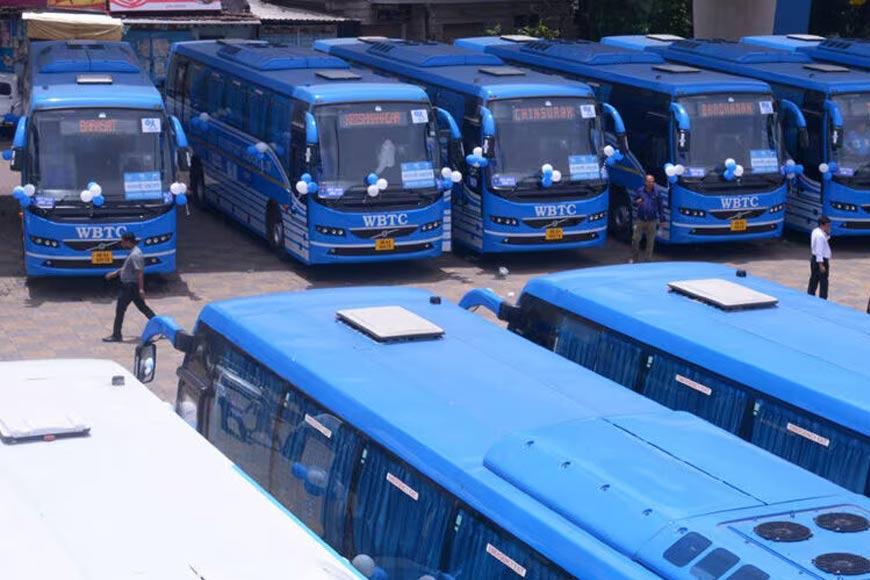Kolkata bus roofs are to be fitted with air filters, according to a govt. initiative

This year on June 5, during a programme organized by the West Bengal Pollution Control Board to celebrate World Environment Day, the state Environment minister, Manas Ranjan Bhunia unfurled a surprise gift for the citizens of Kolkata. He flagged off a state bus with Bus Roof Mounted Air Purification System (BRMAPS), an innovative device that will monitor the air quality as the bus moves along its demarcated route in the city. Named ‘Shuddha Vayu,’ this is the first of its kind device being used in India.
With temperatures ranging between 29°C and 45°C, Kolkata heat is scorching and very unforgiving during summer. The high humidity makes the weather balmy and uncomfortable and the situation turns intolerable while travelling by crowded buses. Most of the time, the buses are packed to capacity and some passengers even hang on to the gate for dear life. The lucky ones manage to put their toes on the foothold and leave the rest to God, Passengers get pushed and shoved inside like rag dolls and the stale stench permeates the atmosphere. Smoke and dust from the road create a suffocating situation. But all that is going to change soon, thanks to the new initiative undertaken by the West Bengal government. The government has launched buses with air purifiers to bring down pollution levels in the city. According to a statement issued by the West Bengal Pollution Control Board (WBPCB), the Bus Roof Mounted Air Purification System (BRMAPS), named ‘Shuddha Vayu’, is the first of its kind in India. As part of its pilot project, the state Pollution Control Board in collaboration with scientists from IIT Delhi has launched 20 such buses. Kalyan Rudra, chairman, of WBPCB emphasized the need to launch the pilot project to help record the seasonal variations of the pollution levels and also to find out how the devices perform on the road.
The state environment department also announced its decision to introduce drone surveillance to monitor whether industries are using Air Pollution Control Devices (APCD) judiciously. The drones will be fitted with sensors to measure the real-time air quality of an area. In recent times, the state PCB has been receiving multiple complaints from citizens about a large number of industrial units in the state as well as different pockets of the metropolis, turning off their pollution tracking devices at night to evade the surveillance of WBPCB and release the poisonous pollutants into the atmosphere.
According to a statement issued by the WBPCB, the BRMAPS are fitted with sensors to measure the air quality of the ambient air – such as levels of particulate matter on a real-time basis, as the vehicle moves along the road. The air filter attached to the system will capture pollutants from the air as the bus moves on its route. It will suck up the pollutants and release clean air into the atmosphere. The air purifiers are fitted with high-efficiency particulate absorbing filters and activated carbon filters to bring down levels of polluting gases and suspended particles by around 90 percent.
Also read : Kolkata to have all-electric bus fleet by 2030!
The real-time data will be sent to the Integrated Command and Control Centre of the WBPCB for further evaluation. Everyday pollution level will be monitored for around 8 – 20 hours depending upon the time for which the bus plies. The air-conditioned buses plying in the city will also be fitted with a Bus Inside Air Purification System (BIAPS) to clean up the air circulating inside the buses. This will provide clean breathable air to commuters.
The state environment department also announced its decision to introduce drone surveillance to monitor whether industries are using Air Pollution Control Devices (APCD) judiciously. The drones will be fitted with sensors to measure the real-time air quality of an area. In recent times, the state PCB has been receiving multiple complaints from citizens about a large number of industrial units in the state as well as different pockets of the metropolis, turning off their pollution tracking devices at night to evade the surveillance of WBPCB and release the poisonous pollutants into the atmosphere. It is difficult and often unsafe for officials to enter the factories during odd hours to check pollution levels and probe how norms are being violated. The state environment department will also deploy drones at night to measure and combat industrial pollution. The drones will be fitted with sensors to measure the real-time air quality of an area. The sensors would initially measure levels of particulate matter. Later they may be equipped with sensors to collect data on other gaseous pollutants such as Sulphur dioxide and Nitrogen dioxide. Steps will be taken against these flouting industries as per law, warned the state Environment minister, Bhunia.
This year on June 5, during a programme organized by the West Bengal Pollution Control Board to celebrate World Environment Day, the state Environment minister, Manas Ranjan Bhunia unfurled a surprise gift for the citizens of Kolkata. He flagged off a state bus with Bus Roof Mounted Air Purification System (BRMAPS), an innovative device that will monitor the air quality as the bus moves along its demarcated route in the city. Named ‘Shuddha Vayu,’ this is the first of its kind device being used in India.
The theme of this year is ‘Beat Plastic Pollution’. The minister urged all sectors to curb the use of single-use plastic less than 120 microns because plastic bags are a major cause of environmental pollution. He informed his department has already identified 60 plastic manufacturing units in the state and he plans to call the authorities of these units for a meeting and urge them to obey the rules and regulations running their units. If they still flounder rules, they will be dealt with strictly.










